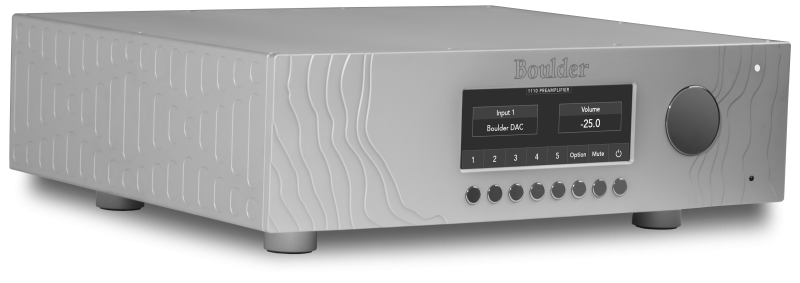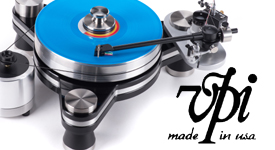Press Release | Louisville, Colorado – Boulder Amplifiers is pleased to announce the immediate release and shipment of the 1110 Stereo Preamplifier. The 1110 is the aesthetic and pairing mate to the 1160 Stereo Amplifier and the second product release in the new 1100 Series.
The 1100 Series is Boulder's mid-level product line and achieves exceptional performance through new technology yet manages to reduce size and cost vs. Boulder's 2100 Series.
The 1100 Series is a substantial advancement over the previous 1000 Series. Vast improvements have been made in sound quality through the use of better ground paths, thermal management, circuit topology, and lowering of the static noise floor. Increased use of surface-mount PCB technology, manufactured on Boulder's own SMD manufacturing machines and ovens has also yielded improvements in noise radiation, propagation delay, parasitic capacitance and the elimination of lead inductance in selected circuits. It also offers improvements in unit-to-unit quality and consistency with the added benefit of long-term reliability.
Five sets of balanced, line-level inputs on XLR connectors are included, as well as a pair of fixed line-level auxiliary outputs.
The 1110's volume control is Boulder's next generation CMOS actuated stepped volume control. This attenuator is adapted from the 3010 Preamplifier and is fully-balanced to reduce noise, increase resolution, and eliminate step noise. Various options for the volume control can be programmed, including step resolution, startup level, maximum output level, and volume scale.
Also new for the 1110 is the use of a 64-bit, multi-core ARM (Advanced RISC Machine) processor for all supervisory functions, including management of turn-on/turn-off, input selection and user interface, error notification, display driver, web page generation, and HTML- or IP-based external control. The ARM processor will also enable the use of Boulder Net, an IP-based unit-to-unit detection, system layout, control, and communication architecture available to external control systems such as Savant or Crestron and application-based control systems. For units that are network connected, an HTML setup and control page is available by simply entering the preamplifier's IP address into a browser. If connected to a live Internet feed, the 1110 will also announce when software updates are available and automatically download and install the update when instructed.
Gain stages within the 1110 are Boulder's proprietary 983, which are unique to the 1100 Series. 983 gain stages feature surface-mount design with machined, board-mounted heatsinking and provide a total of 20 dB of gain with exceptionally wide bandwidth. The 983 combines discrete and monolithic design with high-current drive for extremely long cable runs (up to 300 feet or 91m) or non-traditional load input impedances.
The most obvious new development in the 1110 is the evolution of the 1000 level casework from angular corners to softer, rounded edges that include radii and curves. The front panel has also been changed to reflect the geography near Boulder, Colorado and features a reproduction of the topographical map of Flagstaff Mountain. A full-color LCD display is centered in the front panel and is controlled and driven by the unit's ARM processor. This display shows all current function settings as well as offering a simplified platform for setup and option menus.
About Boulder Amplifiers, Inc.
Boulder is the world's premiere luxury and high-performance audio manufacturer and is based in Louisville, Colorado. It is a member of the Consumer Technology Association and is the last remaining high-end electronics manufacturer in North America to engineer and produce all aspects of its products in-house. Boulder was founded in 1984 as a manufacturer of broadcast and recording studio equipment, transitioning later to fine home audio electronics.




































